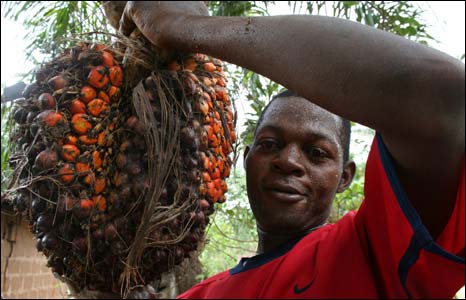
When people in the rest of the world think of Nigeria, what they readily
think is oil, the “black gold” that dominates the Nigerian economy. But if
the Nigerian government and business leaders play their cards right,
Nigeria will be known for another oil: palm oil. If so, this will mean a
new and better day has dawned for Africa’s most populated country.
Over half of the Nigerian labour force works in agriculture. However,
Nigeria’s food sector lags behind the rest of the world. According to the
International Food Policy Research Institute, “the overall prevalence of
stunting, wasting, and underweight [in Nigeria] are 42.0 percent, 9
percent and 25 percent, respectively.” We can and must do better.
To unlock Nigeria’s full potential, and move it beyond its reliance on
petroleum exports, it is imperative that the country launch an
agricultural revolution. A linchpin of any Nigerian agriculture boom will
be palm oil. The cooking oil and food additive is a nutritious and
calorie-rich staple product. It also grows well in Nigerian soil and
benefits from its long growing seasons and lush climate.
Indeed, Nigeria, once boasted a proud palm oil industry that was able to
meet the country’s domestic demand. Nevertheless, today, after years of
stagnation and over reliance on oil and gas, Nigeria is now a net importer
of vegetable oils. This has proven costly to the country and its
consumers. Rural communities have missed an opportunity to rise out of
poverty and achieve food security. How can Nigeria reverse this lamentable
state of affairs?
Every modern agricultural revolution consists of two key ingredients –
capital investment and state-of-the-art technology. Over the last few
years, the Nigerian government has pursued important legal reforms with an
eye toward making the country a more attractive place to invest and
decreasing its reliance on the oil and gas sector. It’s time for those
reforms to bear fruit.
Fortunately, there is a good model for Nigeria to follow. Several
countries in tropical Asia, including Malaysia and Indonesia, reformed
their laws with an eye toward modernizing their agriculture sectors. The
reforms attracted huge sums of investment capital, from China, Australia,
and elsewhere. Flush with capital, Malaysian and Indonesian farmers and
entrepreneurs procured world-class technology to develop their banana,
cocoa, and palm oil sectors, among others. Two generations ago these
countries were as poor as sub-Saharan Africa. Today they are growing fast
and are now net exporters of palm oil.
Nigeria can do something similar. Global investors are increasingly
interested in developing the African palm oil industry. Every day,
representatives of capital-rich companies and governments descend on
Lagos, Accra, Monrovia, and other West African capitals to scout for
opportunities.
Nigeria should use this opportunity to develop its domestic industry. It
could bring to Nigeria the same prosperity enjoyed in palm oil producing
countries of Southeast Asia, countries that have climbed to the ranks of
middle income nations and higher. The need to modernize grows larger every
day. After all, Africa’s population is expected to more than double by
2030. Nigeria alone will be a significant contributor to this growth, with
increasing multitudes of mouths to feed.
To meet the challenges of the future head on, Nigerian policymakers should
set two goals for the country. The first is to produce enough vegetable
oil to satisfy the country’s growing domestic demand. The second is to
grow the sector even larger, so Nigeria becomes a net exporter of palm
oil. Producing ample quantities of palm oil is needed to feed a growing
continent, to diversify the country’s export sector, and to attract
foreign currency reserves. The successful cultivation and development of
major agricultural industries can help deliver genuine food security to
Nigeria. They can also provide vital employment for communities that have
historically suffered from lack of job opportunities.
Some of those poised to benefit most from an agriculture boom include
Nigeria’s legions of long-suffering smallholders. There is a precedent
here: Malaysia’s Federal Land Development Authority (FELDA) promoted
growth that empowered and enriched that country’s smallholders. They
helped bring hundreds of thousands of Malaysians out of poverty and
contributed to infrastructure development and social services. Liberia is
already in the process of successfully emulating Malaysia’s smallholder
experience.
Nigeria has been stuck for years, burdened with a resource curse in the
form of an over-reliance on its huge petroleum industry. By modernizing
its agricultural sector, Nigeria will enter an era of resource blessings
–feeding its people and its neighbors and ensuring a brighter economic
future.
•Thompson Ayodele, Director Initiative for Public Policy Analysis
